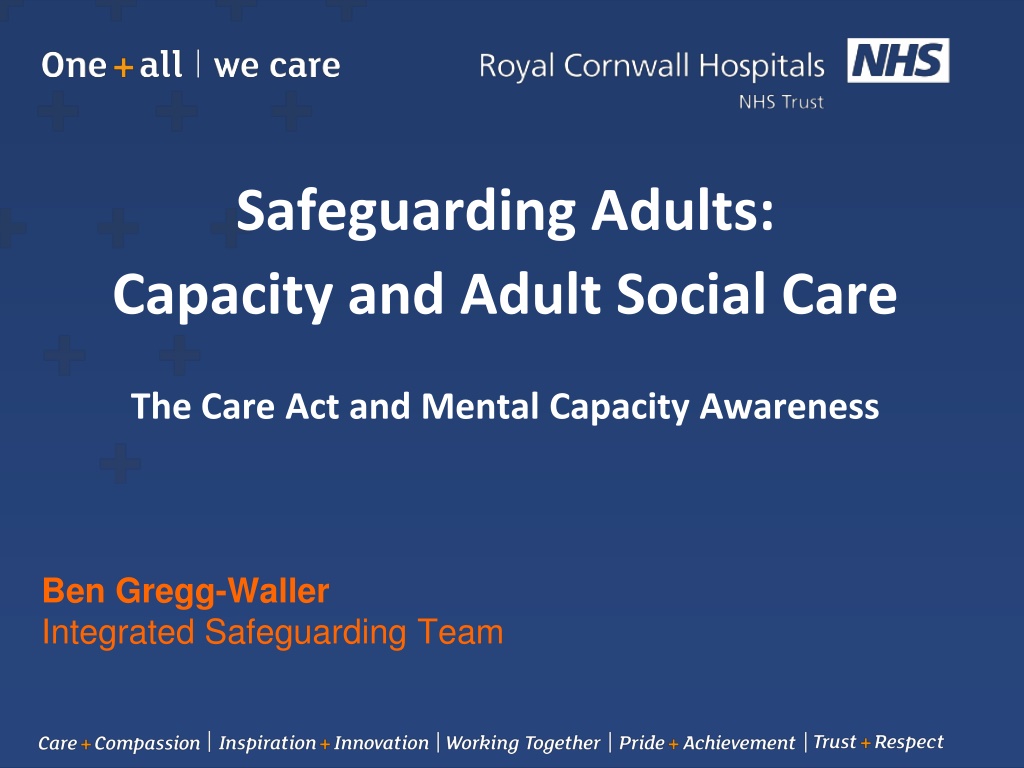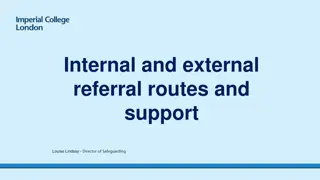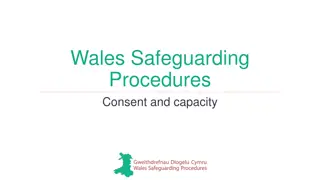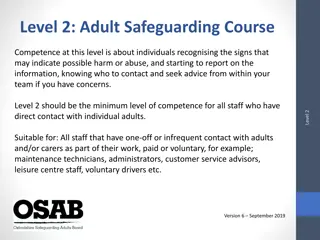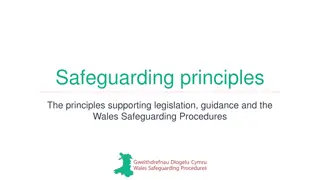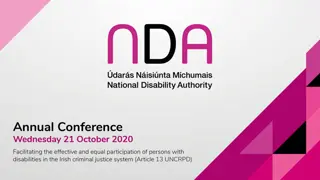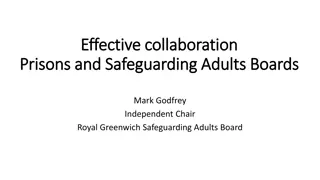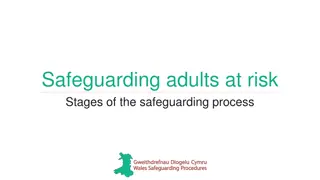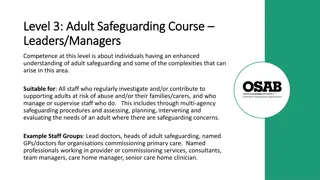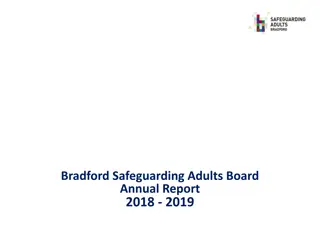Understanding Safeguarding Adults and the Care Act 2014
Safeguarding adults involves protecting their right to live free from neglect and abuse by identifying risks and preventing harm. The Care Act 2014 outlines key responsibilities of local authorities in assessing adults' needs and eligibility for care and support. Legislation such as the Mental Capacity Act and Human Rights Act also play vital roles in safeguarding vulnerable individuals. Awareness of the different forms of abuse and the rights of adults is crucial in providing effective support.
Download Presentation

Please find below an Image/Link to download the presentation.
The content on the website is provided AS IS for your information and personal use only. It may not be sold, licensed, or shared on other websites without obtaining consent from the author. Download presentation by click this link. If you encounter any issues during the download, it is possible that the publisher has removed the file from their server.
E N D
Presentation Transcript
Safeguarding Adults: Capacity and Adult Social Care The Care Act and Mental Capacity Awareness Ben Gregg-Waller Integrated Safeguarding Team
Safeguarding means supporting the adults right to live free from the risk and fear of neglect and abuse. It is about people and organisations working together to prevent the risks and to stop neglect or abuse when it becomes known. This can sometimes be complex in adults. Adults have the right and often make unwise decisions.
Legislation to Safeguard Adults Care Act 2014 Human Rights Act 1998 Mental Capacity Act 2005 Mental Health Act 2007 Homeless reduction Act 2017 Vulnerable peoples Act 2006 Domestic Violence, Crime and Victims Act 2004 Equality Act 2010
10 Categories of Abuse Physical Abuse Neglect Discrimination Sexual abuse Financial abuse Psychological abuse Organisational abuse *Domestic Abuse *Modern Slavery *Self Neglect Safeguarding App for your phone Go to App library and Type in NHS Safeguarding
The Care Act and what it means to adults you work with
Sections of the Care Act 2014 that we need to be aware of: Section 9: Requirement to assess needs Section 10: Requirement to assess carers needs Section 11: Adult at Risk Management (ARM) Section 42: Duty to enquire (safeguarding enquiry) Section 67: Right to an independent advocate
The Care Act 2014 sets out in one place, local authorities duties in relation to assessing people s needs and their eligibility for publicly funded care and support. Under the Care Act 2014, local authorities must: Carry out an assessment of anyone who appears to require care and support, regardless of their likely eligibility for state-funded care Focus the assessment on the person s needs and how they impact on their wellbeing, and the outcomes they want to achieve Involve the person in the assessment and, where appropriate, their carer or someone else they nominate Provide access to an independent advocate to support the person s involvement in the assessment if required Consider other things besides care services that can contribute to the desired outcomes (e.g. preventive services, community support) Use the new national minimum threshold to judge eligibility for publicly funded care and support.
The Care Act is the basis of all current The Care Act is the basis of all current adult safeguarding processes! adult safeguarding processes!
Examples of care and support needs: Not all care and support needs are visible. Care and support is the mixture of practical, financial and emotional support for adults who need extra help to manage their lives and be independent - including older people, people with a disability or long-term illness, people with mental health problems, and carers.
So you suspect one of the adults you work with may have additional unmet needs or is at risk of abuse or neglect? You should act by making the appropriate referrals inline with your agencies policy. Contact Safeguarding services: Within the health trust contact the safeguarding SPOA 01872 255741. Community services (care homes/home care providers) contact ASC 0300 1234 131 opt 3 Voluntary services contact ASC 0300 1234 131 opt 3
What is needed to cause a safeguarding enquiry under section 42 of the care act? The person must have or have the appearance of care and support needs They must be experiencing or at risk of experiencing abuse or neglect They are unable to protect themselves from abuse or neglect Key Points about safeguarding and the care act. Absolutely everyone is entitled to an assessment under the care act There only has to be the appearance of care and support needs and a risk of neglect or harm to raise a safeguarding concern Some examples of unable to protect themselves can include temporary in- capitation due to drink/drugs or mental health crisis and coercive and controlling relationships. Only a social worker can make decisions about a safeguarding concern
The Mental Capacity Act and its link with Safeguarding Adults When working with adults we must take into account the person s mental capacity in relation to their care and treatment and their right to self determine. The Chain of Consent and Capacity Consent = Understand the Nature (what) + Purpose (why) + Consequences (risks) Consent is freely given (not coerced) When a person cannot consent the MCA can be applied (where the person is over 16yr and there is a cognitive impairment)
The Mental Capacity Act (2005) To empower people to be able to make their own decisions To ensure decision made on behalf of people are made in their best interests To provide the less restrictive interventions The Mental Capacity Act Recap Start from a presumption of capacity however if there is a cognitive impairment - assess An unwise decision does not indicate a lack of mental capacity, neither does non engagement! Always involve the person they are at the centre of decision making at all times.
Assessing capacity A capacity assessment is not a test tell the person you are assessing their capacity! Is there an impairment of, or disturbance in, the functioning of the person s mind or brain? Is it sufficient to cause the person to lack mental capacity? Can the person Understand the information Retain the information Use or weigh the information Communicate the decision Document the method and outcome of your assessment clearly!
The Mental Capacity Assessment Tool www.desuto.com/tools Simple online tick box Mental Capacity Assessment Tool
Advocacy Advocate referrals must be made when: A person has been assessed as lacking capacity to make a major decision about serious medical treatment or a longer-term accommodation move and they have no family or friends to consult with. Contact the Advocacy People 0330 440 9000
Deprivation of Liberty Safeguards (2007) DOLS offers a legal framework to prevent a person, who lacks capacity, from leaving a hospital or care placement. DOLS offers the person a right to appeal DOLS must be in the persons best interest, for the provision of care and or treatment. Applying for DOLS It is the responsibility of the team caring for the patient to complete the mental capacity assessment and apply for a DOLS authorisation. Our Legal Duty Recognise and apply DOLS
